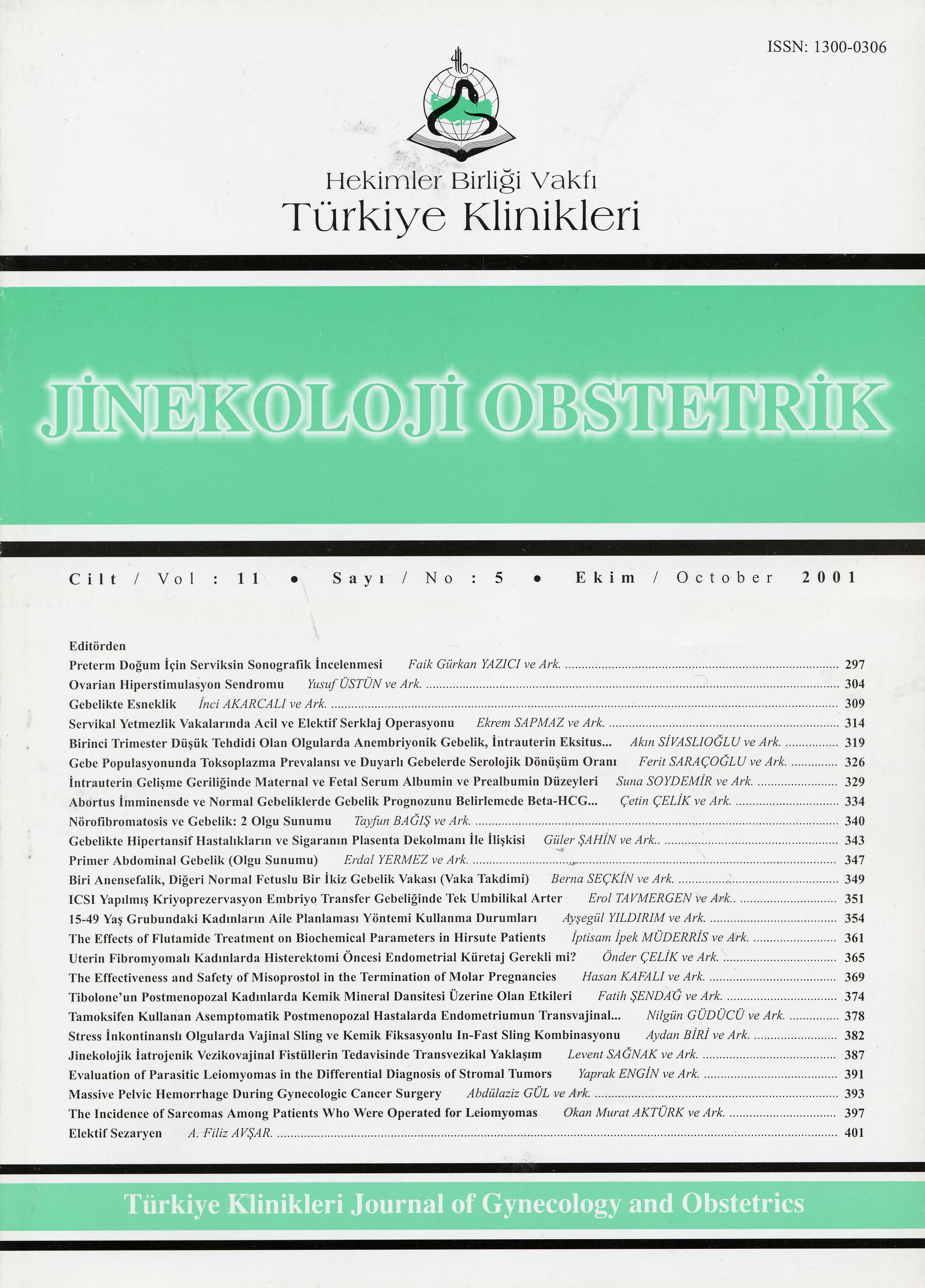Open Access
Peer Reviewed
ARTICLES
3382 Viewed2206 Downloaded
TransveSical Approach in the Treatment of Gynecologic Iatrogenic Vesicovaginal Fistulas
Jinekolojik İatrojenik Vezikovajinal Fistüllerin Tedavisinde Transvezikal Yaklaşım
Turkiye Klinikleri J Gynecol Obst. 2001;11(5):387-90
Article Language: TR
Copyright Ⓒ 2025 by Türkiye Klinikleri. This is an open access article under the CC BY-NC-ND license (http://creativecommons.org/licenses/by-nc-nd/4.0/)
ÖZET
Giriş: Vezikovajinal fistüllerin etyolojisinde sıklıkla jinekolojik girişimler, obstetrik travma, radyoterapi ve genital kanserler rol oynar. Bu çalışmada jinekolojik iatrojenik vezikovajinal fistüllere transvezikal tedavi yaklaşımımız tartışılmıştır. Materyel ve Metod: 1994-2001 yılları arasında kliniğimize başvuran 20 kadın hastaya vezikovajinal fistül tanısıyla geç dönem, fistül traktını çıkararak transvezikal fistül onarımı uyguladık. 3 hastamızda eşlik eden unilateral üreterovezikal obstrüksiyon tanısı nedeniyle aynı seansta unilateral üreteroneosistostomi uyguladık. Flep interpozisyonu kullanmadık. Bulgular: Hastalarımızın yaş ortalaması 50.2 yaş idi.Etyolojide %75 ile en yüksek oran abdominal histerektomi idi. 2 hasta bize başvurduğunda sekonderdi. Hastalarımızın primer etyolojiden operasyona kadar geçen süreleri ortalama 37.3 ay idi. Hastalarımız ort. 22.5 ay takip edildiler ve nüks 2 (%10) hastada gözlendi. Biri yeni operasyonu kabul etmedi, diğeri ikinci bir transvezikal tedaviyle şu an sorunsuzdur. Bu şekliyle toplam başarımız %95dir. Sonuç: Vezikovajinal fistül tedavisinde seçilecek yöntem cerrahın kişisel tercihine bağlı olmakla beraber geç dönemde uygulanan ve fistül traktının çıkarıldığı transvezikal yaklaşım etkin bir tedavi yöntemidir.
Giriş: Vezikovajinal fistüllerin etyolojisinde sıklıkla jinekolojik girişimler, obstetrik travma, radyoterapi ve genital kanserler rol oynar. Bu çalışmada jinekolojik iatrojenik vezikovajinal fistüllere transvezikal tedavi yaklaşımımız tartışılmıştır. Materyel ve Metod: 1994-2001 yılları arasında kliniğimize başvuran 20 kadın hastaya vezikovajinal fistül tanısıyla geç dönem, fistül traktını çıkararak transvezikal fistül onarımı uyguladık. 3 hastamızda eşlik eden unilateral üreterovezikal obstrüksiyon tanısı nedeniyle aynı seansta unilateral üreteroneosistostomi uyguladık. Flep interpozisyonu kullanmadık. Bulgular: Hastalarımızın yaş ortalaması 50.2 yaş idi.Etyolojide %75 ile en yüksek oran abdominal histerektomi idi. 2 hasta bize başvurduğunda sekonderdi. Hastalarımızın primer etyolojiden operasyona kadar geçen süreleri ortalama 37.3 ay idi. Hastalarımız ort. 22.5 ay takip edildiler ve nüks 2 (%10) hastada gözlendi. Biri yeni operasyonu kabul etmedi, diğeri ikinci bir transvezikal tedaviyle şu an sorunsuzdur. Bu şekliyle toplam başarımız %95dir. Sonuç: Vezikovajinal fistül tedavisinde seçilecek yöntem cerrahın kişisel tercihine bağlı olmakla beraber geç dönemde uygulanan ve fistül traktının çıkarıldığı transvezikal yaklaşım etkin bir tedavi yöntemidir.
ANAHTAR KELİMELER: Vezikovajinal fistül, Transvezikal yaklaşım
ABSTRACT
Introduction: Gynecologic procedures, obstetric trauma,radiation therapy and gyneacological cancers were take place in the etiology of vesicovaginal fistules. In this study transvesical approach in the treatment of gynecologic iatrogenic vesico-vaginal fistulas was discussed. Patients and Method: Between 1994-2001 we applied delayed transvesical surgery with the excision of fistula tract to 20 women who had vesicovajinal fistulas. Three of these patients went to unilaterally uretheroneocystostomy in the same session because of additional uretheral injuries. We didnt use flap transpositioning. Results: The mean age of the patients was 50.2 . Abdominal total hysterectomy was the common cause in etiology as 75% . Two of the patients had gone previous unsuccesful transvesical surgery. The mean time from the causetive surgery to the operation was 37.2 month. The mean follow-up period was 22.5 months and in the 2 (10%) of the patients we had recurrence. One of them refused the new operatıon and the second one was totally cured after a repeating transvesical surgery. As a result our success rate was 95%. Conclusion: As the treatment modality is due to the surgeons choise the delayed transvesical approach with the excision of fistula tract is an effective treatment alternative in vesicovaginal fistulas.
Introduction: Gynecologic procedures, obstetric trauma,radiation therapy and gyneacological cancers were take place in the etiology of vesicovaginal fistules. In this study transvesical approach in the treatment of gynecologic iatrogenic vesico-vaginal fistulas was discussed. Patients and Method: Between 1994-2001 we applied delayed transvesical surgery with the excision of fistula tract to 20 women who had vesicovajinal fistulas. Three of these patients went to unilaterally uretheroneocystostomy in the same session because of additional uretheral injuries. We didnt use flap transpositioning. Results: The mean age of the patients was 50.2 . Abdominal total hysterectomy was the common cause in etiology as 75% . Two of the patients had gone previous unsuccesful transvesical surgery. The mean time from the causetive surgery to the operation was 37.2 month. The mean follow-up period was 22.5 months and in the 2 (10%) of the patients we had recurrence. One of them refused the new operatıon and the second one was totally cured after a repeating transvesical surgery. As a result our success rate was 95%. Conclusion: As the treatment modality is due to the surgeons choise the delayed transvesical approach with the excision of fistula tract is an effective treatment alternative in vesicovaginal fistulas.
MENU
POPULAR ARTICLES
MOST DOWNLOADED ARTICLES





This journal is licensed under a Creative Commons Attribution-NonCommercial-NoDerivatives 4.0 International License.










